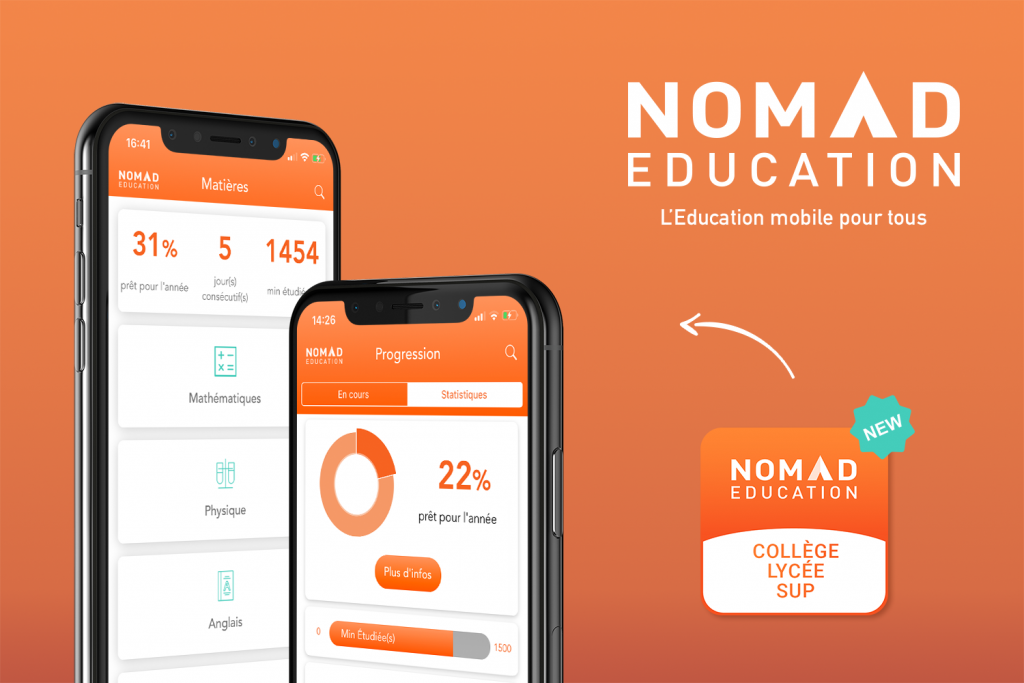With more than one million users and downloaded in nearly 200 countries, the free mobile application “Nomad Education” aims to provide a wide range of education to the greatest number of people, and continues to accelerate, particularly in French-speaking Africa. Meet its director, Caroline Maitrot.
Yes, I joined Studyrama as an advertising manager, then I climbed the ladder to the general management. I was always trusted there and I took everything with me, but it wasn’t my company. It seemed normal to me to leave and create my own project afterwards. I was mature enough and I wanted to move forward on my own.
It’s different. You’re on your own, there’s no recurring theme and you take a lot more risks. You have to have a global knowledge of everything, from finance to marketing. These are also some apprehensions, but I won’t go back.
It is a free mobile application that does not require an internet connection, available on Google Play and iOS. It covers primary, middle school, high school and higher education curricula, both general and technological or vocational. We prepare for 450 diplomas.
It is available in all countries of the world, present in 29 African countries, and downloaded in 200 countries. Our objective remains the French-speaking world, and our main audience is located in French-speaking Africa, France and Quebec.
Yes, we have developed a library of thematic knowledge in which you can find all sorts of fields: marketing, law, accounting… These programs range from beginner to expert level, and are accessible to everyone, including parents. In 2021, the plurality of our teaching enabled us to win the AI prize from the public investment bank.
Education is at the center of my concerns. I come from the countryside, I am the daughter of a father who had a CAP in roofing and I always wanted to be good at school because I was told that it was important to progress in life. I then had the opportunity to do a preparatory course and to leave the Corrèze, a French region. I want to pass on this opportunity.
Africa came to us quite naturally. We found ourselves with a large audience very quickly and noticed that there was a real desire to learn and invest in education. It’s also a continent with real needs, with a significant population growth and infrastructures that can’t always keep up or a lack of access to school. The cell phone has very quickly taken the place of the computer, which is a promising element. We decided that we had to speed up and take a real interest in this continent.

Until last August, we were funded by higher education institutions, by the Ministry’s prevention campaigns, and by federations that wanted to promote the attraction of their profession. This makes for some very nice things, but it doesn’t change things.
Today, we are positioning ourselves on something else. Everything that is free will remain free, but we have created a premium subscription whose idea is to re-engage parents in their children’s education, and to accompany them within the programs. It’s a paid subscription that allows people to succeed at school but also to enrich their culture and knowledge throughout their lives. Our goal is to have 6 million members by the end of 2023, 3 million in France and 3 million in Africa.
It’s a substitute if there isn’t one. I don’t necessarily believe in e-learning 100%. More and more bosses are saying that the people who will succeed tomorrow will be competent in “soft skills”. These skills are learned through sharing, through sports, in the playground or with friends. I don’t necessarily want a world where everything is learned on a computer. Technology must be at the service of people and encounters, but school remains a place of socialization where it is important to evolve.
Aurélie Kouman – Journalist
© 2021 14 Km – Designed by COMFORDEV
© 2021 14km – Designed by COMFORDEV